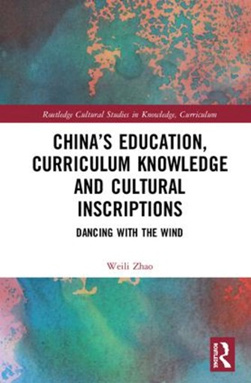
. > WHAT'S NEW > BOOKS
Restoring original connotations of Chinese characters
Author : SUN CAIPING Source : Chinese Social Sciences Today 2019-08-23

China’s Education, Curriculum Knowledge and Cultural Inscriptions: Dancing with the Wind
The concept of epistemicide was first proposed by the Portuguese sociologist Boaventura de Sousa Santos in 2007 to refer to the cultural colonial impact of Western mainstream culture on Latin America and other countries in the southern hemisphere. This epistemicide does not necessarily imply overt superiority of modern Western epistemology, only that it is a unique understanding. This means that even if colonial systems have ceased for a long time, colonial features still exist in the fields of cultural and knowledge-based production.
In China’s Education, Curriculum Knowledge and Cultural Inscriptions: Dancing with the Wind, Zhao Weili, an assistant professor from the Chinese University of Hong Kong, believes that China’s epistemological crisis was generated in its process of modernization. The Vernacular Movement in the early 20th century fundamentally changed the traditional Chinese grammatical structure. The introduction and translation of Western words greatly promoted the development of modes of Western thinking in China. Several movements for the simplification of Chinese characters of the 20th century manipulated the Chinese script further away from its original cultural connotations. Some Chinese people cannot even understand ancient Chinese books and their inherent references to Chinese culture, even if they have studied ancient Chinese.
In the field of education, Western theories, concepts and methods are considered not only different from those of China, but also more advanced and scientific, such that they have dominated mainstream discourse and research and have become the criteria for evaluation of Chinese academic circles since the late 1990s.
The author argues that many words with Chinese cultural connotations such as “su zhi” (quality) and “su yang” (literacy) are usually explained by Western concepts and thinking. This is a typical epistemological crisis in the field of Chinese education. It is in this cultural context that the book strives to jump out of the Western discourse system and explore the Chinese way of thinking. Starting from “feng” (wind) and “jiao” (teaching), characters that are often used in Chinese schools, the author tries to help these Chinese characters restore their original cultural and educational connotations.
In this book, Zhao does not use the method of logical argumentation; rather he adopts the case study method to analyze contemporary Chinese educational discourse around words such as “feng,” “jiao” and “shen ti” (body). In the last chapter, the author revisits his own research journey as a post-foundational case study. At the same time, he learns from the research methods of historical archaeology to break from the western-centric tendencies in the current study of cross-cultural comparison.
Ye Shengtao made Chinese fairy tales from a wilderness
Ye Shengtao (1894–1988) created the first collection of fairy tales in the history of Chinese children’s literature...
-
How northern ethnicities integrated into Chinese nation
2023-09-18
-
Mogao caves
2023-09-12
-
Mogao Grottoes as ‘a place of pilgrimage’
2023-09-12
-
Time-honored architectural traditions in China
2023-08-29
-
Disentangling the civilizational evolution of China
2023-08-28
-
AI ethics in science fiction
2023-08-23













 2011-2013 by www.cssn.cn. All Rights Reserved
2011-2013 by www.cssn.cn. All Rights Reserved